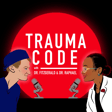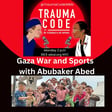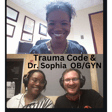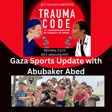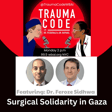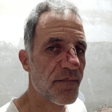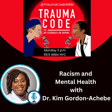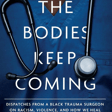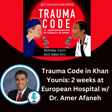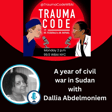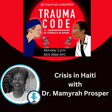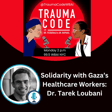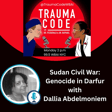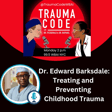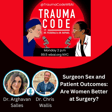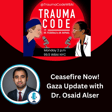Become a Creator today!Start creating today - Share your story with the world!
Start for free
00:00:00
00:00:01

Free Dr. Khaled Alser! Trauma Code on Peter Beinart's Notebook
Dr. Simon Fitzgerald discusses the telemedicine collaboration with Nasser Hospital's trauma team with a global network of specialists as well as the forced disapparance and torture of Dr. Khaled Alser, the lead author of a recently published article in The Lancet: Trauma care supported through a global telemedicine initiative during the 2023-24 military assault on the Gaza Strip, occupied Palestinian territory: a case series.
Transcript
Introduction to Trauma Code
00:00:00
Speaker
at 1 p.m. here on WBAI New York at 99.5 FM and WBAI.org online. It's one minute past 2 p.m. Stay tuned for Trauma Code coming up.
00:00:27
Speaker
Trauma Code to New York City, Trauma Code to WBAI. I am Dr. Simon Fitzgerald, a Brooklyn trauma surgeon and surgical intensivist. And I am Dr. Cassandra Rafael, an adult and child psychiatrist. Welcome to Trauma Code. Together we will focus on healing of mind, body, and community from trauma. We'll discuss how wellness fits into the culture at large. Join us on Monday at 2 p.m. on WBAI.
Violence in Gaza: Recent Updates
00:01:27
Speaker
Welcome back to The Trauma Code. This is Dr. Simon Fitzgerald and at the moment I am live and in studio in downtown Brooklyn ah for Monday September 16th at 2 p.m. and that was just Yusef Day's black classical music and ah you know if if you were listening on WBAI you just heard us sort of um you know the worst of the updates I'd hate to call it that but um what Some of the old generals would have called the butchers bill from ah Gaza ah with the body count of 34,000 names and IDs and ages and I understand 14 pages are dedicated to infants under one year old, just a devastating live accounting of ongoing genocidal violence.
00:02:15
Speaker
um and And we'll have a little bit about that on today's show. I actually had anticipated that I would have to be ah working with Clinical Obligations today, so I prepared a recording with the editor, I think editor-at-large, at Jewish Currents, Peter Banart. There was just the the um Jewish Currents JC Live event this weekend. I had to be out of town, so I didn't participate.
00:02:40
Speaker
um But actually right before something like a week or two ago, it was supposed to be held at Boston College and they apparently had reported to the JC Live organizers a need for emergency repairs and canceled the booking like a week or two in advance. so uh... i think in many ways just part of the ongoing suppression of good faith kind of academic work related to peace and justice in gaza in particular in palestine i think there was a lot of that going on at jc live with jewish currents so in any case i prepared for it today and we're
Interview with Peter Beinart
00:03:15
Speaker
gonna uh... air a recording an interview with peter bainard part of his peter bainard's notebook
00:03:21
Speaker
Um, for if you're interested in his work, definitely look up Jewish currents and look up Peter Baynard. And I think next week on Friday in the same, um, series, they're going to have, I don't have the woman's name in front of me, the Palestinian American of elected official from Georgia, Ruwa's last name is not coming to me.
00:03:41
Speaker
ah who was um and the ah uncommitted delegates' um request to speak at the Democratic National Convention. So anyway, I'm going to play a recording with piar Peter Banart from Jewish Currents. It's part of his um Peter Banart's notebook series, and we'll check back in before the end of the show. And definitely before we go to the recording,
00:04:06
Speaker
If you appreciate this show, if you appreciate what we do, we don't have the reach or the broadcast without standing on the shoulders of WBAI and ah
Supporting WBAI New York
00:04:16
Speaker
that legacy. So definitely give online to help pay the bills ah at www.wbai.org. Give to WBAI. Click the donate button. We appreciate you, New York. It's going to be an interview with me, Simon Fitzgerald, and Peter Banhart.
00:04:32
Speaker
This conversation with Dr. Fitzgerald is a collaboration with a show that he has on WBAI, which is called Trauma Code. So to everyone who's listening on WBAI, thank you for being here and for this collaboration with the Beinart Notebook Zoom call on Substack.
Telemedicine in Gaza: Challenges and Efforts
00:04:50
Speaker
ah Dr. Fitzgerald, I'm really grateful that you could do this.
00:04:53
Speaker
Thank you for having me. I'm very grateful for you sharing your time and your platform. And yeah, and I'm appreciative of your audience. I think and we're going to talk about some things that are controversial in my universe and also in a lot of the audience. And I appreciate you listening and being present with us.
00:05:09
Speaker
Absolutely. So maybe you can just talk a little bit about how you became involved in telemedicine in Gaza as a physician. Definitely. um Well, first I'm going to just introduce myself real quick to Ori and I'm a trauma surgeon at King's County Hospital in Brooklyn. I've been there probably about six years.
00:05:30
Speaker
And, you know, I've always been vaguely interested in following what's going on in the Holy Land. I grew up Jewish. I was a bar mitzvah to Baltimore Hebrew congregation. My involvement, when I got a radio show about a year and a half or two years ago, and I got in touch with interesting people, especially connected to the world of surgery and trauma surgery, but also public health, also culture, artists, authors and stuff.
00:05:54
Speaker
Well, one person I reached out to was Dr. Osaida Sur, who at the time was doing research with Haytham Kafrani, who I think now is the head of patient safety at JACO at the time was at Harvard. And he was looking at surgical capacity in Gaza and the West Bank in Palestine. Medical and especially surgical capacity. He wanted to be a plastic surgeon, wanted to be a burn surgeon. I said, come on the show. He didn't want to be the center of attention. And the paper came out. I don't remember exactly, but approximately October 2023.
00:06:24
Speaker
And then, you know, I witnessed a little bit, as I think a lot of us did, the confusion of October 7th, the killing and also the misinformation and then the wild militaristic response since then. And I'm sorry, I'm being a little long-winded, Peter. Feel free to cut me off.
00:06:39
Speaker
But it wasn't until the killing of Dr. Hamam Aloh, who was a nephrologist at Al-Shifa Hospital. And I don't remember the date of it. I feel like it was the end of October, or early November. And he did an interview with Democracy Now with Amy Goodman. And he said, we are being exterminated.
00:06:56
Speaker
And like a week or two, whatever it was later, he was killed along with his family, including another doctor and his family. And then I didn't have any doubt if I'd ever thought about it before, like, oh my God, I'm witnessing genocidal violence. And part of that is directed at killing health care workers and destroying health care capacity. I'm going to give it back to you in a second, but that includes Shiffa Hospital, where Hama Malow worked.
00:07:18
Speaker
I think five or six department chairs have been murdered since October, including one Dr. Adnan al-Bersh, who was in Israeli custody for four months before he was killed. His body has not been released. We don't know the mechanism of death, but we know from witnesses of prisoners who've been released that he was being beaten and basically tortured.
00:07:39
Speaker
ah So I reached out to Osaid, and his brother Khalid was a surgeon at Nasser Hospital in communist in January and February. I wasn't involved, but they had done a presentation of his work, what he's seeing, like a Grand Rounds type of thing. And then it became clear that Nasser Hospital was going to be a target of attack, and they were able to organize a network through WhatsApp, ad hoc,
00:08:05
Speaker
Idea was first day of February and within a week or two had a thousand people, specialists on the list to give help and to be expert support. And my only involvement was X. I knew I was Said. I'd been trying to talk to him. I got him on my radio show and in that way I was on board with whatever he was organizing.
00:08:25
Speaker
So, sounds like you had this radio show, you had gotten connected to someone in Gaza, you were following a bit what was happening there, and then what kind of assistance were you offering? Obviously, you weren't there in Gaza, but what kind of assistance were you offering to the folks who were practicing medicine under those incredibly difficult conditions?
00:08:44
Speaker
Yeah, excellent question. And one of the reasons why I'm on this show is that a Lancet article describing our work. So anyone who has an interest in reading academic literature can definitely go online right now at the Lancet and find that article. It's called Trauma Care Supported Through Global Telemedicine Initiative During the 2023-24 Military Assault on the Gaza Strip. There's even more words in the title, but I'll stop there.
00:09:08
Speaker
But honestly, my role was a very humble role in the clinical side of it. I am a trauma surgeon. I'm a surgical intensivist. But even a lot of the doctors in Gaza was seeing more trauma and things that I hadn't seen previously. I offered a little bit of help when they had some chest tube problems.
00:09:25
Speaker
But there was a lot of people, you know, there was neurosurgeons, there was craniofacial surgeons, there were pediatric surgeons, right? A lot of kids were getting injured, mangled limbs, there was senior orthopedic surgeons. So the general surgeon over there, Dr. Khaleda Sir, was only a couple of years behind me. and You stacked up our institutions or whatever, but I didn't offer a whole lot, but I witnessed what was going on and Dr. Esser at times was being in a position of deciding when to do brain surgery and he's never really done that except a little bit in medical school or early training so people are sending him articles, diagrams, videos trying to help him decide when it's like okay this one is not going to survive just give some pain medicine and comfort if you have it and reserve the big operative interventions on people it's a better hope of survival so
00:10:18
Speaker
And then that was in February, and by the end of February, Nasser Hospital was being attacked, literally bombed. He was recording a voice note to send to us. You know, he sends us patient information with patient permission, some images, and sometimes descriptions. And connectivity was difficult. so He was organizing a voice note that then he could slip up.
00:10:38
Speaker
upstairs by the roof and without being on the roof and risking being shot by snipers send a message and while he was recording it we could hear the explosion in the background killed a patient in their bed one of the nurses was shot in the chest while in the operating theater as i understand it and became our patient One of the surgeons, I think a plastic surgeon orthopedic was there at the time, was hit by shrapnel fired by a drone, a remotely controlled drone with belligerent military capacity, was shooting inside the hospital and hit one of the surgeons that we work with.
00:11:11
Speaker
so there's a way in which and when i think i was witnessing that our kind of telemedicine was morphing right in front of us in this kind of black mirror way into a forensic anthropology of the genocidal violence in gaza incontinence in particular in february perhaps into march when we were on the line you know i was seeing my phone go off at midnight two in the morning could be anytime when they had these things and i would look at it getting these Kind of horrific images, some of which people have seen on social media now it's so prevalent but also trying to think through it with the surgeon and then realizing the team's under attack.
Forensic Documentation and Leadership in Crisis
00:11:47
Speaker
Hospitals being evacuated, patients dying in their bed because electricity and oxygen is cut off.
00:11:53
Speaker
So, honestly, the most value that I added is that when that happened, when Nasser Hospital was invaded, and everybody kicked out, and it was basically occupied by Israeli military forces, I wrote up an article for The Guardian, describing Kora with Osayed Asr, the Palestinian surgeon from Gaza, who's training in Texas right now, in Lubbock.
00:12:15
Speaker
So it's his cousin Khaled, that transoceanic collaboration snowballed into this telemedicine effort. and And really my main value was just to write it up for the Guardian to give a little bit of attention in real time, like a week or two after the hospital was invaded.
00:12:31
Speaker
Though, if I understand correctly, what happened, Dr. Pritzker, is kind of organically a whole group of doctors from around the world basically got on this WhatsApp channel trying to provide assistance to the doctors in Gaza who were working under these really horrifying conditions, just kind of advising them about the cases that were coming up for them. I'm gonna go care of the patients. Under these circumstances, is that right?
00:12:55
Speaker
Yeah, absolutely but what you said contains a lot of wisdom and prompts a lot of questions. But yes, absolutely. And I think it's worth noticing that the reason why a trainee in Texas, Osaita Sir, and his cousin, a recently graduated surgeon, and this is not, I've immense respect for both of them and their abilities and their minds and their experiences.
00:13:20
Speaker
But I think those young people are in a position of leadership, not only because of what they've accomplished, but because of the vacuum of leadership of major institutions, major organizations. And one of the other reasons why I'm i'm sorry, I'm a little bit all over the place. I hope you'll forgive me. But what happened after the invasion of Nasser Hospital initially? and Sorry, Dr. Michelle, Nasser Hospital is where in the Gaza Strip?
00:13:45
Speaker
In Con Eunice. Con Eunice, okay, go ahead. And it's probably the second, and again, I have some knowledge of this, because Osaeed, our co-author in the Lancet article, right before October of last year, had studied medical and surgical capacity in Palestine, in West Bank, in Gaza. So he was like the foremost expert on that as well. So it was probably the second biggest hospital in the Gaza territory, after Shifa Hospital, which had already been destroyed in Gaza City.
00:14:12
Speaker
So, it was force evacuated. Our friend and colleague, Dr. Khaleda, visited his family in Rafah or something, and they came back when Israeli forces were treated. And while they were trying to clean up the hospital and make it suitable for patients to seek care, particularly the ongoing tsunami of trauma patients, the hospitals re-invaded, and on March 25th, We speculated at the time, but based on witness statements, he was taken into custody by Israeli forces and disappeared from Nasser Hospital. And we had no proof of life from him. This is Dr. Khaled Al-Sed, the cousin of the father of her colleague who is studying in Texas. Correct, absolutely right.
00:14:53
Speaker
So he was forcibly disappeared. The Israeli government wouldn't acknowledge it. And there was an Amnesty International campaign I think in June that started up. So he was gone two plus months before even the Amnesty is looking for him and making statements looking for him.
00:15:09
Speaker
And it wasn't until July that actually I am grateful. One of the things that we did while we were organizing the Lancet paper to bring attention to Dr. Oster, I spoke to an Israeli friend of mine and he said, you should reach out to Israeli physicians for human rights. They managed to have some kind of presence in Israeli detention facilities, even black sites.
00:15:27
Speaker
And I reached out to them and indeed on July they were able to get testimony from him from over prison outside of Ramallah and confirm that he indeed had been disappeared by the Israeli military. And this I have notes Israeli physicians for human rights sent us.
00:15:44
Speaker
a memo or some kind of official document based on the interview from memory that the representative it had had with Dr. Aser and he reports that he was disappeared into some kind of occupied facility, house or building or whatever in Gaza for five days and abused there and then taken to the end. I really don't know Hebrew. I don't understand said it Taman that facility that has been notoriously a torture center.
00:16:10
Speaker
that's been described in a Human Rights Watch report about torture of Palestinian health care workers from Gaza. And he reports being tortured and witnessing torture and witnessing the use of electric shock, stress positions, dogs, beatings, that sexual violence, forced penetration. You're saying this is in the interview that was recorded by physicians for human
The Case of Dr. Khaled: Concerns and Suppression
00:16:33
Speaker
rights of Dr. Alsar.
00:16:34
Speaker
Yeah, he's saying he did not suffer the worst of those, although the beatings and many of the other things he did. And he says that he was a survivor of torture, but he witnessed on other people because it was all done in a group setting, like some kind of warehouse tarmac or whatever, this public beating and humiliation. And and there was a case where the gang rape basically of the prisoner, this is reported elsewhere, not by Dr. Alsir, but in that same facility was so bad that the prisoner went to a hospital in Israel and had awful injuries like up into the chest of organs and really a brutal attack, very relevant to trauma surgery and the amount of surgery he had to undergo to recover. And even those officers were initially detained but had not been prosecuted. and
00:17:18
Speaker
One of the things that troubles me is how much support that kind of violence continues to get in Israel, and that in sitting with the case of my colleague Dr. Aser, you know, I'm hoping to, in working for his release, propose an alternative that we take care of people together instead of propagating violence together into the future. What do you know about his situation now, Dr. Aser?
00:17:42
Speaker
We've had no proof of life since July 23rd. So, you know, time's going by. Last we heard he was an over facility in Ramallah. And there's been no recognition by the Israeli government. And I will say after the Lancet article published, finally, I am an acquaintance of Ryan Grimm, who went to University of Maryland when I was there, who writes for Drop Site News. And I've been bugging him to write an article on this. And he recognized once a Lancet article came out,
00:18:08
Speaker
how much journalistic value this Israeli Physicians for Human Rights report was. And so that's published online. You can look it up and find it and read exactly what his testimony is word for word. Well, as reported by the Israeli Physicians for Human Rights Lawyer, not directly quotes from Palladassar. Right. So we have a question about the medical community in the United States. It sounds like you created this kind of ad hoc group of physicians around the world who were trying to help physicians in Gaza I'm curious about what the response has been in the medical community in the United States more generally, like professional associations, in terms of trying to give assistance, in terms of making statements of condemnation, or whether there's also been pushback within that. As obviously I imagine you have in the United States doctors who have a wide range of political views on this subject.
00:18:59
Speaker
Definitely. And what I say may sound a little bit controversial, maybe not in this audience, but when I go back to work. But I think it's not just an absence of our medical leadership, institutional leadership, organizational leadership, but there's been active suppression, widespread suppression. I can think of four grand rounds that have been canceled at major medical institutions. What are grand rounds?
00:19:25
Speaker
So Grand Rounds are like our either weekly or monthly presentations of important academic work as a department or as a hospital. Big slide shows and things, present presentation of the guest or whatever. I had proposed one, admittedly um controversial, but a medical perspective on the history of genocide in January. And obviously going into Gaza because I felt that in an objective view of the history and current events fit the definition of genocide.
00:19:53
Speaker
That was canceled by my leadership, perhaps not surprisingly, I was pushing the envelope. But a lot of others just recently at Loyola outside of Chicago, there was a presentation to a department of pediatrics on morbidity and mortality of pediatric patients in Gaza. And like particular reasons why caring for them is difficult. That was canceled because not allowed to talk about that. I know another one at UC Davis canceled.
00:20:17
Speaker
um And for example, I organized to have a speaker, Dr. Ferro Sidwa, who had been at European Hospital on the other side of Con Eunice for two weeks or so. He was there with Dr. Mark Perlmutter. People may have seen their interviews about what they witnessed, including assassination of children, clear light kill shots, torture of medical workers and them getting back to the hospital and seeking treatment.
00:20:40
Speaker
And he was the one who had it canceled in California. And when I tried to bring him over, the students, physicians for human rights, the student chapter through a network loosely affiliated with the group who managed to get in and talk with Khaled Elsir. And they were told they couldn't have a room. And when I did it at King's County Hospital instead, they were told they couldn't promote it. And literally the CEO of not my hospital where I work, another hospital was calling my HR department, suggesting I'd be disciplined for political organizing on campus.
00:21:10
Speaker
That is a level of suppression that we've seen in addition to absence. I've been very disappointed and at times even angry about the lack of solidarity and even just can't believe we're suppressing good faith research on decreasing morbidity and mortality among civilians including children in Gaza. I don't think that should be controversial but it very much is.
00:21:32
Speaker
Yeah, we have a question about the claim that hospitals have been used for military purposes by Hamas or maybe by
Military Use of Hospitals Debate
00:21:41
Speaker
Islamic Jihad. Obviously, this has been a claim that the Israeli government and its supporters have been making a lot and justifying. And i since this is so much present in the conversation, I just wanted to ask you from your experience how you answer people who raised this point.
00:21:57
Speaker
What can I tell you? I have seen some very good evidence of a military force using a hospital grounds as the basis for military attacks. It's when the IDF forces has seize hospitals and use them for the base of attacks on the surrounding area. I think a lot of this talk of the dual use of health care in Gaza and Palestine is in bad faith.
00:22:18
Speaker
as a campaign to destroy what has happened and continues to happen, I think the apparent result was the intended result. The organized destruction of health care in Gaza, including destruction of health care workers and facilities and infrastructure that keeps Palestinian life alive in Gaza.
00:22:36
Speaker
So these other kind of attacks and stuff, you know, was somebody once held hostage in a basement somewhere of a hospital? I don't know, maybe, but that doesn't justify the genocidal violence that we've seen. And the Israeli military has had no qualms about, for example, using vans disguised as world food program to launch attacks for seizing hospitals and launching attacks. So I just think it's not in good faith. And we've seen the killing not only of health care, but humanitarian aid workers and people responsible for distributing food. I think all that other stuff is just bad faith. I've heard it called Hasbara, but I don't speak Hebrew enough to put that into my sentence. But um that's what I have to say about that. And I don't know where people are getting their information, what spokesperson, but I've been talking to people in the hospitals in real time while this is going on. So that's my opinion.
00:23:26
Speaker
There's also been a lot of discussion in the US press about the casualty numbers, the death toll numbers coming out of the Gaza Ministry of Health. And then there have also been some reports. I think there was a letter to Lancet a little while ago by several academics speculating about how large the number of deaths could be given all of the ancillary ways that this public health catastrophes from all these interactions with doctors in Gaza and hearing what they're going through, what your sense is about the magnitude of the number of people who may ultimately die as a result of this war.
00:24:01
Speaker
Yeah, sometime recently a phrase that's been bouncing around in my head, I keep thinking there's gonna be a Dachau moment. I don't think we know the answer to your question. The Lancet letter was hypothesis generating, so I don't think it's too much value to fixate on that, but we know all kinds of people are dying from violence, from malnutrition, from interruption of medical services, right? If you have a heart attack right now in Gaza, you die. If you had renal failure, you're dead.
00:24:28
Speaker
I think at some point, if we have to clean up the bodies in Gaza, I don't know when that will be. I thought it would be by now. But I think our Dachau moment sooner or later is coming. And then maybe we'll know the numbers. Yeah. I'm sorry. And for people who don't know why the reference, my understanding is Dachau, unlike a lot of concentration camps, was actually in Germany. And the surrounding community, right, in Poland and other places, maybe a lot of the neighbors had been killed or run off.
00:24:57
Speaker
But in Dachau, the people there were like home party people. And American forces, including Jewish forces, were so stunned to witness the piles of emaciated bodies and skulls and stuff and the industrial liquidation and burning of people that they made the surrounding community come and clean it up so that they couldn't act ignorant about the systemic violence they had been a part of. And maybe not. But in a way, I feel like that is coming sooner or later if we're willing to look Gaza in the face.
00:25:28
Speaker
As far as you know, how many hospitals in Gaza are still functional compared to how many were operating when the Israeli invasion began?
Gaza Hospital Operations Amid Conflict
00:25:37
Speaker
I wish I had those numbers in front of me. I think something like 32 or 34 health facilities, but something like 20% of the hospital beds were in the one hospital in Chiffa Hospital, which has been destroyed literally. The surgical building bombed and burned. Every window smashed, every piece of equipment to clean water, distribute oxygen, or get power has been destroyed.
00:26:01
Speaker
So I've seen different numbers, and there is something dynamic. I think there may be limited care available at SHIFA right now, but what percent of what it was? like There's a constant fight. I saw pictures recently of dialysis at SHIFA hospital, which is incredible. They killed their nephrologist already. So these things are are waxing and waning. I don't have a great number, but I think the vast majority of the healthcare care infrastructure and capacity has been destroyed.
00:26:25
Speaker
Is it 80% or 90% or 75%? I don't know. But again, I think if, God willing, we can stop the violence, get our colleague Dr. Khaledasir out of Israeli black site and be present with him as he takes stock and rebuilds capacity, then we'll know. What do you recommend that people who want to bring attention to his case, what would you recommend that they do?
00:26:51
Speaker
So thanks to Ryan Grimm and Democracy Now, if you Google, the one problem with Dr. Khalil al Sur's Arabic name has been transcribed in different ways in different media. I think it's spelled differently amongst Amnesty International. I spell it the way that Dr. Osayid al Sur spells his name because they're cousins, but I gather there's more than one way to do it. Every scene also with this, the young Turkish-American who was just killed with a sniper shot to the head,
00:27:18
Speaker
outside of beta her name has had various felons because of the transliteration but i'm sorry i got a little distracted remind me the question of the question was uh... what do you recommend what can we do who want to bring attention to his play thank you very much for asking a question and i appreciate are you here making space for us to talk about doctor kala sir cuz that's what it would take i'm surprised there hasn't been more traction in mainstream media i'm reaching out to the guardian nine seven two in israel and the intercept I think it deserves attention and we should ask questions. American and Israeli spokespeople should answer that question specifically, where is Dr. Kalara, demand habeas corpus, but I think also in our professional spaces and And I have to be honest, ah I have not had a close relationship with organized Judaism for years. And part of that has been it's been a little bit hard to find space where being honest and open like I am right now is a healthy part of synagogue life, but also that's part of it's on me I could have found something if I had looked harder but I think
00:28:19
Speaker
Having the difficult conversations about where our money is going, including demanding it of our elected officials, the genocidal violence would not be possible on this scale without the billions of dollars of armaments sent from our country. And I think the best way to stop armed violence, whether it's in Gaza or in Brooklyn, is to stop arming the belligerents. And I think that's the demand right now. But for Dr. Kalilow, sir,
00:28:44
Speaker
Talk to people in media. If you're a physician, especially your know organizations, your groups, this should be an organized question of where is Dr. Khaledow, sir? Return him to the community of healthcare care physicians. And he's one of at least a hundred, right? There's probably been 800 healthcare workers killed in Gaza and more than a hundred in Israeli custody. And the Human Rights Watch has described the type of violence, including torture, that they've suffered.
00:29:09
Speaker
So this should be a much bigger campaign than Dr. Khaledow, sir, I think is just a representative, an example, because he's our colleague, he's our guy, he's the first author on a Lancet paper from last week, and we should be demanding that he be returned to take care of his patients and be with his family.
00:29:26
Speaker
You mentioned the interaction with physicians for human rights in Israel. I'm just curious if you've had any interactions with Israeli doctors more generally about this and about how they're reacting to what's happening to the doctors in Gaza.
00:29:42
Speaker
i actually work with some israeli doctors and we sort of choose not to talk about this much they know about my publications and for example the guy who hired me he has an israeli background family in israel but i think he respects the academic value of what we're doing so i basically have mostly chosen not to talk with people i have to work with the israeli physicians and the israeli physicians i talked to her are ones like Physicians for Human Rights, so I seek them out and speak to them. And Physicians for Human Rights, they've had some criticism about how they've covered some reports of rape and things if it was accurate. But I think it was a good faith mistake and they've been working for Dr. Usher's release and and for at least documenting and being present with people and recording for posterity what is really going on to these healthcare workers. But outside of that, I haven't had much interaction.
Medical Ethics Under Siege
00:30:33
Speaker
right I imagine that the kind of issues that the doctors in Gaza have been dealing with that you were trying to assist on the WhatsApp must have created terribly difficult medical ethical dilemmas, right? I mean, given the choices the doctors had to make about who to treat and how to treat under such extraordinarily difficult circumstances, I just wonder, maybe you can talk a little bit about, given the training doctors get in terms of medical ethics,
00:31:01
Speaker
what are some of the challenges, the issues that you confronted or your colleagues confronted under these really terrifying circumstances? Yeah, and you know, what's a little bit interesting is the closest similarity from my life, my experiences that I could think to what we were witnessing was during COVID. It was different. The hospital wasn't being attacked. It wasn't the malice of armed violence. But, you know, we ran out of things and had to decide this person isn't worth the resources because we know that their outcome is really poor.
00:31:31
Speaker
But i I don't know, I think maybe it helped a little bit to have a second opinion on the WhatsApp so that he could distribute that burden of making that decision on other people. But I'm more struck with the much greater moral calamity is the ethical culture that allows the systematic destruction of health care and killing of health care workers. Maybe is what you're getting at. In some ways, there has been a lack of empathy from institutions of Israeli physicians, right? There was a big open letter in support of attacking El Shifu before it happened.
00:32:01
Speaker
by doctors. By Israeli physicians, right, including like a prominent pediatrician and things like that. So I think that's really troubling. And I will say I had nightmares either during those weeks we were most active or right after, imagining that I was in that situation with my kids and all of a sudden had to like deal with it and it kind of woke up with a panic attack. So yeah, I honestly think that's the bigger question in quo because it's ongoing and we're complicit in it in a way.
00:32:29
Speaker
Yeah, ah we have a question about nursing organizations. I wonder if there's been any difference in where they've responded from the the organizations of American physicians. No, and there has been campaigns and in a lot of organizations and institutions, including one of the major nurse organizations, like an organized campaign to try to move the institution. I don't think that they were successful. The main ones I can think of, the CIR, the Coalition of Interns and Residents, was early in calling for a ceasefire to their credit.
00:32:58
Speaker
And I think the American Public Health Association, but that was a real months long battle amongst people who were members of that organization against their leadership and finally pulled the leadership into some kind of statement and support a ceasefire. But no, I can't really think of a major medical healthcare organization besides the unions that have been bold enough to demand an end to the violence and solidarity with people like Dr. Khaled El-Sar.
00:33:25
Speaker
And I've been hoping, you know, there's a major trauma conference going on right now, not in New York, and I think Chicago. I'm trying to get people to bring it up. I think Hassan Abu-Sitta might be there, who was a surgeon at Chifa Hospital and also Ali Baptist Hospital when it was bombed early in the conflict. So there's some space we're fighting for it, and I think by doing good faith academic work,
00:33:48
Speaker
to decrease morbidity and mortality in Gaza. We're fighting for space to do that, and maybe we'll see some change. And I'm hoping that Dr. Khaled Elsert's case can be one where we can kind of see ourselves and all agree that, okay, he should be free, and then we can, you know, take it from there.
Public Health Crisis: Polio Outbreak
00:34:04
Speaker
Yeah. We have a couple of questions about the threat of polio in Gaza and the vaccine effort. What do you know about that?
00:34:12
Speaker
What I can say, I'm really struck. I'm old enough to remember thinking as a kid that we would eradicate polio in the world before I was an adult. I mean, there's reasons why that failed. Some of them connected to armed violence as well. But I think the systemic destruction of water and hygiene and sanitation infrastructure led to this outbreak. And I think it was a predictable result. And in some ways, it was on purpose. It was part of the organized destruction. It was just a byproduct.
00:34:39
Speaker
But, you know, it looks bad. And so there's been an organized effort to immunize children. You know, I've seen pictures of kids who were killed the same day they were immunized by armed violence. So there's some cynical people saying that Western, especially Israeli, effort to immunize children is more about protecting their populations from the spread of polio than benefiting the Palestinian population.
00:35:01
Speaker
But um obviously it's a good thing, but you can't take care of people. You can't immunize them effectively while you're destroying the healthcare care infrastructure. So until that stops, I think everything else is in bad faith. Yeah. One of the things that's obviously been a theme in US media since October 7th than even before is about kind of generational differences among Americans and how they see Israel and Palestine. And I'm curious whether you have noticed that in the medical profession.
00:35:27
Speaker
That's an interesting question. Maybe, but no more than in society at large, I think. I don't know. There are other people who are smarter about that than me. I didn't witness what the older generation witnessed growing up and how they were socialized with these things. ah Yeah, it definitely is also reflected there. Yeah.
00:35:44
Speaker
And is the WhatsApp group, is it still going? Are you still in daily contact with doctors in Gaza trying to help them, you know, make these decisions?
Barriers for Foreign Medical Aid
00:35:52
Speaker
There is a social media-based telemedicine support effort. It's a little bit more directed, so not a thousand people get every concern. I'm not actually getting the messages right now. They're from spread out across providers around Gaza. But I know, for example, they were asking for more dermatologists recently because of the spread of rashes and things.
00:36:14
Speaker
related to hygiene and malnutrition. So I know it's ongoing, but that the intense trauma connection with the trauma team at Nasser Hospital was effectively destroyed by the Israeli invasion of the hospital and taking of Dr. Kalodowser into Israeli custody.
00:36:30
Speaker
Yeah, I've been amazed watching these doctors from the West, like you mentioned, Hassan Abu Sito lives in the UK, who actually gone to Gaza and actually practice under those really, really dangerous conditions. I'm just curious about how people are even able to do that. Is that something that you consider doing actually going yourself? And what is it like for the people who try to come in and practice medicine and then leave?
00:36:55
Speaker
Before it seemed possible, my wife told me that I was sort of forbidden from doing it because she thought the chance that I would be killed was too high. But I know some people, like I mentioned, Ferro Sidwell was there. Right now, I don't think that it's possible because of the destruction of the so-called Philadelphia corridor, the Rafah Crossing. You can't get in from Egypt. For the best of my knowledge, you can't get in from Egypt. And so, for example, now there's a policy, anyone of Palestinian origin is not allowed to be a physician in Gaza.
00:37:24
Speaker
And so it's extremely challenging even to get in right now. I knew people who were there, I think in March and April, like Dr. Mark Perlmutter, like Froze said, well, and I think Froze has a lot more international experience, so it's used to some of the things, but just witnessing, like being in this black mirrored episode of genocide, I think is the thing that struck them the most. You know, everything else was them struggling to work with depleted resources, but I think Every inch of the hospital is taken up by refugees from other areas that, even though it's not safe at the hospital, it's not safe anywhere else. They think it's safer. It's at least more likely to have running water and things like that, although you can have one toilet per every hundred or thousand people.
00:38:05
Speaker
So I think that's really what i struck the people I've spoken to the most about being present there. ah Yeah, definitely Dr. Ghassan Abu-Sitta, I really admire his courage and his presence. You know, he's lost many friends and colleagues that he worked with at Shifa Hospital and he was present and witnessed really horrible mass casualties from the bombing at Ali Baptist.
00:38:25
Speaker
I don't know I could do with what they do. Honestly, I don't. I think with my current family situation, I cannot. But definitely even the little bit of telemedicine I did gave me nightmares. I can't imagine what they have to go through and deal with. I wonder when you think about the moral responsibility of physicians in situations like this, if there are any historical examples or examples of doctors who you felt like in times of moral crisis acted in a way that you kind of look to as a doctor as models for yourself.
00:38:56
Speaker
Um, I actually, I started hearing something different in what you were asking. Um, but I've definitely witnessed people who I thought were leaders in things like public health, violence prevention, just be like either strangely in denial or a pro genocide in this moment. And it's just not possible to have, I've tried and been very frustrated with good faith conversations. What can I say? I've been trying to work with people I've seen as leaders on this.
00:39:20
Speaker
But it's been challenging, I think, to come out in front and take a leadership role on this. You could have hospital CEOs calling your HR department, tell them to discipline you. And if you're in a precarious situation, you know, they called up the head of Columbia and got them thrown out of their chair. So, ah you know, I think it's a bit of a scary moment in a lot of ways.
00:39:38
Speaker
Yeah, we have a few moments left for people who have questions. I noticed in the chat a comment about Noam Chomsky not having made any statements. I think that's because of health issues that he's been facing. now is I don't think he's made any public statements on any issues over the last year or so. And it's not as a result of him not wanting to comment on Gaza. I'm quite sure that if his health made it possible, he would have done so.
00:40:00
Speaker
I guess my question was a little bit more about historical examples. I mean, you had mentioned Dachau. I mean, there have been throughout modern history situations where physicians have been put in these moments of crisis and responded in different kinds of ways. and I'm just wondering if there are historical examples of physicians who've acted ethically under conditions of crisis that maybe offer a kind of inspiration for you.
Historical Inspirations in Medical Ethics
00:40:25
Speaker
Definitely. I want to answer your question with two examples. I don't know that I have a great answer for you, but two that are resonating with me, historical examples. One is a physician and one is not. So I hope you'll grant me that. One, when I was presenting to try to organize academic presentations and on my radio show talking about healthcare in Gaza, my father, who's an emergency physician for years in the Bronx and in Baltimore, told me that it really reminded him in some ways of reading about Hiroshima.
00:40:53
Speaker
In some ways, the scale of the dead is actually starting to mirror. There is, I think, a useful comparison to Hiroshima. So i he gave me a memoir of the director of one of the hospitals close to the atomic bomb blast, but managed to maintain enough of its structure that it became a center for refugees and everything else like the hospitals.
00:41:13
Speaker
in Gaza. So sitting with that reality, and there's obviously differences, right? When American troops showed up in Hiroshima, they weren't executing people. After weeks and months, there was some ability to set up new infrastructure. But I've been sitting with that historical example. And another book, this isn't an answer to your question, I'm sorry, but another book that has helped me, for example, I said that I walk around with a lot of anger, because my friend and colleague who suffered all this violence, nobody is paying attention to his ongoing plight.
00:41:42
Speaker
But there's a book by, I don't have it in front of me, I'm probably going to mispronounce it, by a Buddhist monk who was kind of a contemporary and well-respected by MLK Martin Luther King. fich What is it? Phich Nhat Hanh, who wrote How to Fight, which is not at all about fighting in some ways, but about being present with emotion and dynamic between people and being at peace and and at the same time sort of giving up hope to master it and master it at the same time and like to see empathy in other people.
00:42:11
Speaker
That's been helping me sit with everything I've been feeling and talking about and going through and giving grace to people, even those I'm frustrated with, giving grace to people that I'm working with and that are also doing important things in their lives.
00:42:24
Speaker
Yeah. I wonder if there's a particular moment or story example that you think of from your interactions with the doctors in Gaza that really illustrated the heroism or the kind of resourcefulness of creativity that they've had to show in order to try to practice medicine under these conditions.
00:42:43
Speaker
That's an interesting question. There's actually a video, I think it's on Instagram, of a OB-GYN, I don't have a name in front of me, I think it's Ella Sully, who was at the front gates of the hospital, an officer hospital, when we were doing this telemedicine, and someone had been shot like across the parking lot or across an alley, something like 20 meters from the entrance to the hospital, but nobody felt it was safe to go there, because they had been shooting.
00:43:09
Speaker
And there's a video of this woman taking off some scarf or something or blanket and figuring out a path, running and ducking, getting into this little corner, evaluating the guy, calling for medics and getting him evacuated into the hospital. um And I was just so profoundly moved by that practice of medicine. And maybe it's something we can all appreciate more than any other medical, clinical examples. But I think for me, that's the experience that is most struck with me.
00:43:36
Speaker
Yeah. I wonder if you can talk a little bit about the hospitals in Gaza. It sounds like many of them have been donated or the money was donated by foreign entities. because I noticed a lot of them are called as like the Turkish hospital or like the European hospital because obviously Gaza even before October 7th was under blockade. It's been a territory that has really been lacking the necessities that a society needs. So maybe you can just what do you know about the way in which medicine was organized in Gaza even before October 7th?
00:44:06
Speaker
Yeah, and and I can answer that maybe a little different than you imagine. And I know there was even Israeli investment in some places in healthcare infrastructure. Part of Shifa Hospital was built by Israeli construction. And it has a culture of medicine and study and a strong medical culture. But one thing that was happening for years, Gaza was neglected and Israel was built up. So a lot of complex conditions for years, for decades, went to Israel or maybe to Egypt or other places for more complex care. Starting with the political rise of Hamas and the Israeli siege in response, something like almost 20 years ago,
00:44:45
Speaker
All that became much more difficult. A lot of cancer patients died. A lot of kidney failure patients died. People who needed advanced care just died rather than going and getting advanced care. So there was an organized effort for those... you think Because it was too difficult to get out. to go Because you couldn't get out of Gaza and the infrastructure had been relatively
Resilience of Gaza's Healthcare System
00:45:03
Speaker
neglected. And so a lot of that stuff wasn't available.
00:45:05
Speaker
So a generation or two of Palestinian health care workers and other people in Gaza built up, considering the poverty of the situation, probably somewhat like Cuba, a fairly robust health care system and ah interest in sort of a standard of care and and people really trying to invest in it. And I think that's why it's been such an organized campaign to destroy it, is because of how much they were able to invest in it. And people were able to get thoracic surgery, I think even WIPO, maybe even cardiac surgery, pretty advanced care considering the relative poverty and ongoing shortages in the territory. As far as you know who built what hospital and how it was funded, I know less about that than I do of the Palestinian health care experience of those times and and institutions and infrastructures.
00:45:52
Speaker
Yeah, this may to be the last question, but we have a question just about you and what led you to become involved in these political issues and to become a kind of activist along with being a physician. I mentioned, you know, most physicians, like most people in general, kind of just do their jobs and do their work and don't get involved in these larger issues.
Dr. Fitzgerald's Activism Journey
00:46:10
Speaker
And I'm just curious, was there something in your background and your life experience that led you to feel like this was something you needed to do?
00:46:16
Speaker
Yeah, I think it's my parents who were born in 49 and 50. So, you know, they were teenagers in the 60s as things changed. And, you know, not everyone got the same lesson from that time period, but they were always involved in human rights issues. My father, I was raised Jewish, but my father is Irish Catholic. He was a part of a Catholic worker community in Baltimore called Jonah House, where Phil Berrigan was, I think his brother Dan Berrigan had been a leader in New York of a sort of, what do you call it? The liberation theology, basically the American equivalent of that. So I grew up seeing physicians working for human rights with people like Phil Berrigan. And I was like, okay, that makes sense. You know, I looked at other things, but ended up, that's what made the most sense for me. And I guess in a way, that's what I'm doing in real time. So many years later with doctors like Osayed and Khalid Alsir,
00:47:08
Speaker
It's funny, yeah, this is one of the things that struck me several times since we've been doing these interviews over the few years. It started with just after October 7th when we interviewed a staffer for a member of Congress who resigned, almost immediately resigned after the invasion of Gaza. And when I asked him why ultimately led to do that, he gave an answer that ultimately came back to his parents and what they had done, which I think is just humbling for those of us who are parents to realize that things that you do can have an impact on how your children behave many, many decades later.
00:47:37
Speaker
Dr. Fitzgerald, thank you so much for doing this. Really, really appreciate it. I'm grateful for the space and the attention of your audience. And I hope I haven't offended anybody too much. I've been speaking a little freely. I honestly didn't know it was going to be video, so I underdressed for a doctor. It's my day off. So forgive me that. But other than that, I'm very grateful for being present here. Thank you for your time.
00:47:57
Speaker
No, my pleasure. And thank you to everyone who's listening on Trauma Code on WBAI in this collaboration with the Beinart Notebook. And then for those of us, just for the Beinart Notebook, next Friday, we're going to be talking to Georgia State Representative Ruar Roman, who was proposed as a speaker at the Democratic National Convention. And also, if you're interested in taking a look at my forthcoming book, pre-orders are available now being Jewish after the destruction of Gaza. Thank you all so much. And Dr. Fitzgerald, thank you. I appreciate you.
Closing Remarks and Future Segments
00:49:24
Speaker
Welcome back to The Trauma Code. This is Dr. Simon Fitzgerald back in the studio on Monday, September, what is it, the 16th? That was just an interview that I had recorded on Friday with Peter Benhart, the editor-at-large at ah Jewish currents ah and as he mentioned Rua Rahman will be ah on his sort of sub-stack life feed whatever you call it whatever collaboration that was from last Friday next Friday will be that senator a rather elective official from Georgia who had been proposed ah to speak at the
00:50:02
Speaker
um Democratic National Convention but in any case we appreciate you listening to us New York City and if you appreciate us the way that you can best support the trauma code and the reach is by paying down paying forward or paying back WBAI and it's a tradition that we stand on the shoulder as of. You can do that at wbai.org and press the donate button or give to WBAI. And I'm here in the studio with Reggie. Do you want to tell us at all, ah is your show coming on tonight at midnight the from the soundboard? Anything that you want to tell our audience ah about that show tonight?
00:50:47
Speaker
ah yeah yeah yeah yeah so I'm gonna conclude on the series of ah classes I've been focusing on from the People's Forum and this week's class of focus will be on ah a class titled uh project 2025 imperialism and capitalism and so that's a really good one and um yeah and that's what uh that's what uh is expected tonight so i'll be tonight at midnight from the soundboard but You've been listening to Trauma Code on WBAI. I'm Simon Fitzgerald. We try to be here every Monday at 2 p.m. and you're just listening to our interview with Peter Banar from Jewish Currents. You can definitely look that up on the WBAI radio archives or on ah your podcast feed wherever you get yours. Look up Trauma Code or Trauma Code, WBAI.
00:51:43
Speaker
on your social media or at gmail.com if you want to reach out to us. Thank you again for joining us in New York. We're going to wrap up with some music and we appreciate you. i
00:53:03
Speaker
afternoon.

